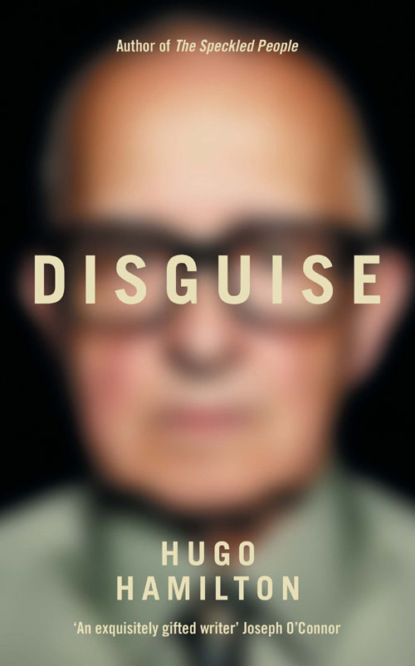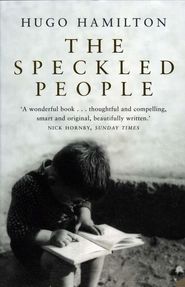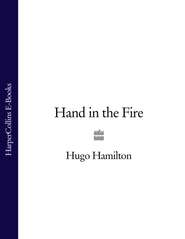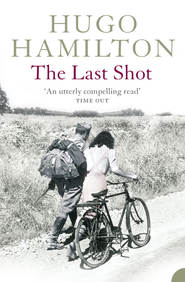По всем вопросам обращайтесь на: info@litportal.ru
(©) 2003-2024.
✖
Disguise
Настройки чтения
Размер шрифта
Высота строк
Поля
He remembers waiting in a room. Maybe it was not just one room, but several rooms, one after the other. Long hours sitting on a bench with his mother constantly looking up to see who was coming in the door. He must have read everything in her face, looked at her eyes to try and understand what was going on.
And that one solid memory remains of standing in the street with soldiers all around. Unable to understand what anyone was saying to him, he refused to take anything from them, didn’t want the black stone they put into his hand and only later understood that that this must have been chocolate. The soldier smiled and bit off a bit and chewed it in his mouth. But he still didn’t want a piece of this black thing, only the sweets which the fat man on the truck gave him. The soldiers and the people in the street were waiting for somebody, and then the sick man was brought out on the stretcher with blood around his eyes and nose. But then he was not allowed to see any more.
These memories were never fully explained by his mother and when he eventually ran away from home, he was in a state of confusion. He had made his own attempts to figure out the mystery of his origins and felt there was something being kept from him. He was only a young boy, not even eighteen, full of doubt and anger and fear. He had not yet found a way of explaining himself or telling his own story.
He never even waited to do his final exam in school. Just packed his bag with the minimum of clothes one day after a terrible argument at home. He got his guitar, rolled up his sleeping bag and took his passport from the glass cabinet. Went to the post office to withdraw all the money he had saved up. He sent his mother a note later on, giving a list of reasons for leaving. He said he could no longer sleep in a house full of antlers and dead creatures. His whole life had been a preparation for catastrophe, being able to live on nothing, surviving on roots and eating ants. He gave his parents no right to reply. It had all gone beyond that point of no return. He knew what they would be saying as they stood in the living room, reading the note over and over again. ‘Let him see what it’s like’ or ‘See how long he survives out there in the big world, paying his own bills.’ He knew that his mother would be worried about him and maybe he wanted to prove to himself that she had nothing more to worry about.
And then he was off. Right from the start he had a clear idea where he was going. Scotland. There was something he had read about the place. He had seen a film about the Battle of Culloden and had an old Scottish tune in his head. In his mind, the Scottish people were like himself, people who had things done to them. When he arrived in Glasgow he didn’t understand a word. His English had all come from the American radio stations, phrases such as ‘give ‘em hell’ which sounded funny to people in Scotland. They thought he was a German comedian. He moved on up through the Highlands and slept in barns to save money. He was hoping to stretch his savings out so that he could stay away forever. The survival instincts that his father instilled in him were coming in handy now.
As the light began to fade every evening, he would walk the road searching for a barn or a shed situated away from dwelling houses, away from people. Once or twice he had trouble with dogs, but he was able to get around them. He would bed down and make a mattress for himself on the hay. He was amazed how warm it was to lie on straw. He was sleeping rough and proud of it. Sometimes he was scared of the dark and stayed awake, listening to the sounds, imagining people creeping up towards him, but then he would fall asleep, and by morning, he would find himself laughing at his own fear. One night he heard a terrible scream nearby, almost human. He scrambled further back along the hay. He had no knife with him for protection. His father had once ceremoniously given him a hunting knife with a handle made from a deer’s foot. But he wanted none of those things to come on this journey. He wanted to be able to trust the world. In the morning, when he moved on, he found out the reason for the scream in the night. A dead deer, caught in a wire fence, hanging from his hind leg.
He wanted to get out of the museum of the dead and travelled as far as he could, all the way up to Inverness. He had no trouble getting into pubs because even though he was only seventeen, he was quite tall. The only trouble he had was getting through the narrow doors with his rucksack and his guitar. In Inverness he ran into a group of young people who invited him to stay. He thought they were out to rob him. When they found that he could play the guitar, they insisted on taking him home to one of their small council houses.
‘You big lanky fucking German bastard,’ they kept calling him. They slapped him on the back affectionately and forced him to have another whisky. He sang his heart out and they sang along. They told him he could stay as long as he liked, though he could hardly make out what they were saying because of the Scottish accent. He found himself saying ‘yes’ very frequently when he was asked a question. They asked him if he had any sisters. They said he didn’t sound like a German when he sang. They told jokes that he didn’t understand, so he laughed, pretending that he got it. And next morning over breakfast, he did get one of their jokes. A fly landed on somebody’s cornflakes. The boy chased the fly away with his hand and then examined his cornflakes for a long time before he said: ‘I do-nae think he ate any of it.’ The others grunted, but Gregor laughed out loud. He kept on repeating it like somebody with learning difficulties.
‘I do nae think he ate any of it,’ he said slowly. They stared at him as he learned the joke off by heart.
He had trained himself to live on nothing. His father would have been proud of him. When he started running out of money, he lived on tea and toast, and jam. He did not allow himself to phone home or ask them to send money. He was determined not to fall into that trap, so he made his way down to London to try and get a job.
He found London dreary. He could not afford accommodation, so he slept in Victoria Station. He started looking for work, knowing that he could go back to Germany any time to work there. But he wanted to live in a foreign place, without support. It was a mission of survival, sleeping in one of the alcoves of the station every night, and in the morning, putting his stuff in a locker to continue looking for work. He managed to get a job on a building site, but he got fired at the end of the day because he was so thirsty and kept going away to the tap for water. He was not really a worker like that. If only he could play music, but nobody wanted to hear his songs.
He saw a rat once or twice, but that didn’t bother him. He slept in his clothes with his empty wallet and his passport in his trousers where he would feel it most if somebody touched him while he was asleep. He trained himself to detect the proximity of another human being, even in sleep. If somebody stared at him for a moment too long, he would open his eyes. The presence of a person nearby would wake him up. If there was no danger, he would go back to sleep again in an instant. He lived the way that his father had imagined for him, ready for the worst. And one night, curled up in his sleeping bag on the floor, monitoring the sound of trains echoing in his head and the sound of London voices drifting past, he woke up with a man standing right next to him. A well-dressed man, carrying a briefcase.
‘You seem like a respectable lad,’ the man said. ‘Why are you sleeping rough like this?’
Gregor told him that he was looking for work. The man smiled and asked more questions. Where was he from? Why were his parents not helping him out? Gregor told him that he was on his own now and had no parents. So the man offered to help him get on his feet in London. He said he could give him a place to stay until he got settled.
‘Look, I’ve got two sons of my own, travelling off somewhere in Australia at the moment. I’d hate to think of them lying around in railway stations.’
Gregor told him he was fine. But then he took up the offer when the man insisted. He had a politeness in his voice which Gregor felt he could trust. So he got into the man’s car, a Jaguar, Gregor remembers, and they drove to the suburbs where he lived in a large detached house, with well-kept gardens and Alsatian dogs patrolling the grounds. There was something welcoming about this wealth and he gave in to the luxury for once.
It was only when the man served him a meal in the middle of the night that Gregor realised how hungry he was and how fed up he was of toast and jam. He was given beer and the man drank whisky. Gregor was soon drunk and elated. He told some of the stories about Scotland, about the fly in the cornflakes.
‘I do nae think he ate any of it,’ he said, and the man laughed heartily.
Then everything went wrong. Gregor was tired, knocked out by the rush of luxury and kindness. It was warm in the house and he fell asleep in the chair. Maybe it was the feeling of being at home. He never suspected anything until he woke up lying on a bed, with most of his clothes off, down to his underpants. The whole thing was a trick. The man was on the bed beside him in his silk dressing gown, stroking Gregor’s chest.
‘Fuck off,’ Gregor shouted, pulling away. In his German accent, it was comical, not even remotely hostile.
‘Relax,’ the man said, smiling. ‘You’ve got nothing to worry about. You’re a tired little monkey, I’m going to put you to bed now.’
Gregor got into bed, but then he found the man getting in beside him.
‘I’m not like that,’ Gregor said.
‘Nonsense,’ the man said. ‘Every boy is like that, only you have been denying it.’
The man was right. Gregor had had some encounters with other boys at school, on long weekends in the country. They sometimes ganged up to pull each other’s trousers down. And once or twice it led to things that would have counted as homosexual, though it was only experimental. A test to see which direction was right for him.
The man must have sensed hesitation. He slid his hand down to his groin and Gregor leaped away from the bed, though he didn’t get far because the man came after him and forced him back on the bed, face down, pulling off his underpants. The politeness was gone. Gregor could feel his erect penis and his balls behind him, like a soft, wiry brush or cleaning utensil from the kitchen, stroking across his buttocks.
‘My lovely German boy,’ the man said.
‘Fuck off,’ Gregor shouted. ‘I’m Jewish.’
The man stalled and backed off, allowing Gregor room enough to move away at last and pull up his underpants again. He stood there with the words echoing inside his head. He was transformed by them, untouchable, unafraid.
‘You’re lying,’ the man said. ‘You’re not even circumcised. Look.’
Gregor found himself having to back it up. He explained that he was an orphan. He told the story of how he had been brought from the East as a refugee. He explained that no Jewish boys would have been circumcised during the war. It would have meant certain death.
That calmed the situation down. Gregor continued his story, as much as he knew of it. And where the facts failed him, he began to make it up. He said he had no parents at all now, that his adoptive parents were dead. For a moment he wondered if it was a mistake to portray himself as a victim, inviting people to prey on him. Would it not have been better to say that he was a prize-winning boxer, to make up a story of how violent he could be? But he had said the right thing after all.
‘I thought you knew,’ the man said. ‘I thought that’s why you came here with me.’
‘No,’ Gregor said.
‘Then you’re very naive,’ the man said.
It was true. Gregor had ignored all the questions he should have asked himself. He had been preparing himself for living on wild mushrooms and dealing with wild animals. He was ready to rough it in the wild and knew how to trap a rabbit without weapons. Knew how to shoot and how to use a knife. But here in the city of London, he was a lost child. Alone, at the mercy of other people.
Gregor felt guilty and stupid to allow himself into this situation.
‘I’m sorry,’ he said.
And then the man became very polite again. He offered to take him back to the station. They got dressed and the night unravelled in the opposite direction again, back into the plush Jaguar with the wooden dashboard, back along the same route into the city. At Victoria Station, he offered Gregor money. Gregor refused, but he forced a few notes into his rucksack. Then he was gone again.
He was embarrassed using the money, but he continued travelling, this time around the west coast of Ireland. When the money ran out again, he made his way back to Germany and worked for a while in a car plant near Frankfurt. After six months he was off again travelling around Greece. Each time the money ran out he went back to Germany to work in one of the cities again, anywhere but Nuremberg, until he had accumulated enough to travel again. He was in Turkey when the Berlin Wall went up. He was back in Munich when the Cuban Missile Crisis blew up. Drifting back and forth for a number of years like this, meeting people, in and out of relationships, discovering as many countries as possible including Morocco and Spain, until he eventually decided to make his way up to Berlin in the late summer of 1967.
He had heard that things were happening up there and on the train to Berlin he met some young people in the same carriage who were excited about going there also. He drank beer with them and they gave him an address where he could stay in the city. Tell them you’re a friend of Lutz von Blessing Doehm, they told him. He thought it was a joke, but then he arrived at the apartment and was given a place to stay on the floor of a commune that later became quite famous because the apartment was owned by a well-known writer. A young man who introduced himself as Fritz came down the stairs to tell him he could stay as long as he liked. There was music playing all day and all night. It was hard to sleep. Everybody was stoned. He never met anyone called Lutz. Instead, he met Martin who had also run away from home under a cloud of anger and resentment.
‘I’m not German really,’ Gregor told him. ‘I’m Jewish, from Poland originally.’
‘Welcome to the club,’ Martin answered. ‘I’m half-Russian myself. My father was an officer in the Russian Army.’
Berlin was the place for everyone to begin afresh.
Six (#ulink_2b16eb65-523b-5d68-8d89-edaa423546fe)
He feels at home here, in this orchard. Is there some distant memory of starting his life in a place like this? Or does everyone get that when they pick apples on a warm day when the summer has spilled over into extra time? That feeling of being connected to the earth in an unbroken chain going all the way back in time, doing what people have done here in this same place for hundreds of years.
The trees are old. Planted long before the war. They must have seen a few things, when this landscape was a battle zone and the farm became a last line of defence. The Russians in the nearby woods and the Germans holding out in the farmhouses. The trees would have witnessed the barn at the far end burning down with the young horses inside. They would have heard their screams. They say the apples from these trees have a unique flavour. Some of the trees are so gnarled that it’s a wonder how they can still deliver the sap to all those distant branches. They are too old to be pruned. And this year has been so dry, the branches are so frail and laden down with fruit that they crack at the touch. Even with no wind, the larger beams sometimes break off overnight.
The orchard was planned to ripen in phases through the summer – cherries, red berries, gooseberries, plum trees, apple trees and pear trees. Isn’t that what mystified the Russians most when they finally conquered these farms one by one, how well designed and logical everything was in comparison to their own? How insane it must have appeared to them that anyone would want to invade any other land when they already had such manicured farms, designed with the vegetable gardens terraced in neat rows, and the orchard facing south and west to maximise the sunlight. And those strong, brick-built farm buildings to provide shelter from the bitter winds coming from the north and the east.
Each variety of apple was chosen to blossom in staggered succession, but in the great heat this year, everything has been ripening together, more or less. Even in spring, the blossoms were all out at the same time, virtually. The birds got most of the cherries, and the berries, stripping them like strings of pearls. The apple trees have produced such a great crop this year.
When Gregor came to visit the farm in spring, they took him for a walk over to the lake, to hear the frogs. It was late afternoon, with the clouds low overhead and the hint of thunder in the air. They invited him to stay for dinner, and afterwards, when he drove home, he found himself returning to the lake to hear the muddy chorus of frogs once more in the dark. Stayed there for almost an hour listening to the sheer volume of sound around him. Frogs close by going silent for a while, making it possible to hear the ones further away, arguing back and forth. Thousands of invisible voices elaborating at once, like some enormous talk show going all the way round the rim of the lake. Flashes of sheet lightning across the water and a delayed rumble in the air. Quite deafening, he remembers. He could not see any of the frogs and that made them seem larger, more human, more unafraid of the elements out here. A brash thunderclap right above him made him jump, but the frogs were not bothered and kept on talking. He hardly noticed that he was being savaged by the mosquitoes, alone in the dark with his T-shirt over his head like an old woman. In school some days later, he got the children in class to imitate the sounds, giving each child a random word to utter in exchange for a croak, a glorious dictionary of babbling classroom frogs.











